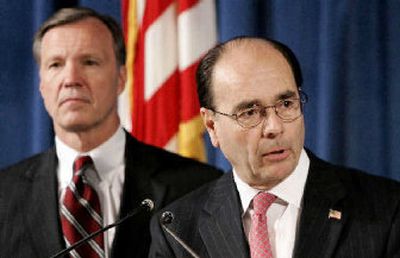Federal oversight office rips Fannie Mae leaders

WASHINGTON – Federal regulators issued a blistering report about mortgage giant Fannie Mae on Tuesday, alleging accounting manipulation aimed at lining executives’ pockets and lying to investors about smooth growth in profits and earnings. The government-sponsored mortgage company was fined $400 million and agreed to limit its growth.
The long-awaited report by the Office of Federal Housing Enterprise Oversight came as Fannie Mae, which has not filed an earnings statement since late 2004, corrects its accounting and struggles to emerge from an $11 billion scandal. The product of an extensive three-year investigation, the housing oversight agency’s report is tougher in its criticism than an assessment ordered by Fannie Mae’s board that was released in February.
The OFHEO review, involving nearly 8 million pages of documents, details what the agency describes as an arrogant and unethical corporate culture, calling Fannie Mae’s image of company prestige and excellence a sham. It said Fannie Mae employees manipulated accounting so that senior executives could collect millions in bonuses from 1998 to 2004, when its accounting came under the regulators’ scrutiny.
OFHEO and the Securities and Exchange Commission announced a $400 million civil penalty against Fannie Mae, the largest U.S. buyer and guarantor of home mortgages, in a settlement over the alleged accounting manipulation. Of that amount, the $350 million assessed by the SEC – one of its biggest penalties ever in an accounting fraud case – will go to compensate Fannie Mae investors damaged by the alleged violations.
The company also agreed to limit the growth of its multibillion-dollar mortgage holdings, capping them at $727 billion, and to make top-to-bottom changes in its corporate culture, accounting procedures and ways of managing risk.
Thirty current and former executives and employees – including Daniel Mudd, the current president and CEO, former chairman and chief executive Franklin Raines and former Chief Financial Officer Timothy Howard – will be reviewed for possible disciplinary action or termination.
Washington, D.C.-based Fannie Mae neither admitted nor denied wrongdoing under the settlement but did agree to refrain from future violations of securities laws.
The report details a series of events in the fall of 2003 involving Mudd, who was then the chief operating officer, in which an employee named Michelle Skinner expressed serious concerns in an e-mail to him about the company’s accounting. The issues were similar to those raised by then-Fannie Mae accountant Roger Barnes to other company officials about a month earlier. Mudd did not deal appropriately with Skinner’s concerns and “missed an opportunity” to recognize potential problems, the report says.
That was a year before the OFHEO regulators brought to light Fannie Mae’s accounting-rule violations and alleged earnings manipulation to meet Wall Street targets – disclosures that stunned the financial markets. In December 2004, the SEC ordered the company to restate its earnings back to 2001 – a correction expected to reach an estimated $11 billion. The Justice Department has been pursuing a criminal investigation.
Raines and Howard were swept out of office by Fannie Mae’s board in December 2004.
From 1998 to mid-2004, the smooth growth in profits and precisely hit earnings targets that Fannie Mae reported each quarter were “illusions” deliberately created by senior management using faulty accounting, the report says.
The Bush administration has been pushing for legislation to reduce the massive mortgage portfolios of Fannie Mae and its smaller government-sponsored sibling, Freddie Mac.